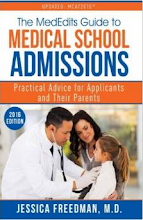Every year I have clients say "I really, really, want to attend a top 10 medical school." When I ask them why this is so important, the answer is typically vague and unsubstantiated. I encourage applicants to put their egos aside and really think about their career goals and which school would be the best fit for them -- if they have the luxury of choice. But, these discussions prompted me to revisit the US News and World Report Medical School Rankings which are often quoted.
The most popular article on this topic is from Academic Medicine which sited many flaws in the US News and World Report ranking methodology. Among several factors, the response rate for completion of surveys sent to medical school officials upon which rankings are based was low which decreases validity. Also, confidence intervals, which account for error and are used in all respected research publications, were not used. The criteria used for evaluation were also very narrow.
So, have these standards changed since this article was written? It doesn't appear that way. This year, rankings were also based on very narrow criteria (peer assessment, residency director assessment, research activity, number of students going into primary care, student selectivity, MCAT score, GPA, acceptance rate and faculty resources). The percentage of responders is not disclosed and it does not appear that confidence intervals are used.
I encourage all medical school applicants to evaluate these rankings with a grain of salt. Also, consider your goals as you decide where you "must" go to medical school. Not convinced? Review the medical schools attended of the people who actually teach at the top medical schools. Their credentials may surprise you. I have one colleague who went abroad for medical school and now has a major role in medical student education at a top medical school from which he was rejected as an applicant.
Click Here to see the Academic Medicine Article.
Click Here to see the US News and World Report Rankings.
MedEdits | Medical School Admissions Consulting
Monday, June 22, 2009
Tuesday, June 9, 2009
The Doctor Patient Relationship
A study done by the Mayo Clinics in Arizona and Minnesota is the subject of a great article in the New York Times today. Researchers found that "patients want their doctors to be confident, empathetic, humane, personal, forthright, respectful and thorough.”
This is a must read for medical school and residency applicants. Think about these qualities as you write your personal statement.
This is a must read for medical school and residency applicants. Think about these qualities as you write your personal statement.
Sunday, June 7, 2009
Clinical Practice: A New Model
A new model of clinical practice is the subject of a very interesting article in the New York Times today. Some doctors, in an effort to provide better care for their patients, are changing the way they practice medicine. By taking matters into their own hands, doctors are decreasing their administrative costs, are able to spend more time with patients and have greater personal and professional fulfillment through the practice of medicine. The Obama administration hopes to increase pay for primary care physicians and has set aside money for the development of community health centers. But, until these reforms occur, some doctors are already embracing change.
On a purely anecdotal level, many of my friends and colleagues who practice primary care, enjoy the practice of medicine more and have a better work/life balance than those who specialize. I encourage all of my medical school applicants and residency applicants to consider careers in primary care.
On a purely anecdotal level, many of my friends and colleagues who practice primary care, enjoy the practice of medicine more and have a better work/life balance than those who specialize. I encourage all of my medical school applicants and residency applicants to consider careers in primary care.
Friday, June 5, 2009
Medical School Admission Requirements: Is Change On The Horizon?
A report released by the Association of American Medical Colleges and The Howard Hughes Medical Institute recommends significant change in the premedical curriculum. Rather than requiring students to take specific courses, the report suggests that students be proficient in a specific set of competencies. While these changes will not happen for a while, the MCAT will also also have to be modified. The AAMC has formed an MCAT review committee and that reevaluation is underway. This MCAT review will be complete in 2012 and the goal is to recommend changes that will make the exam more useful for medical school admissions.
Wednesday, June 3, 2009
Subscribe to:
Comments (Atom)












